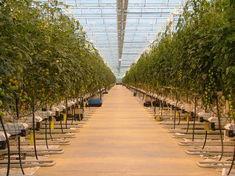
Rising energy costs are already a concern this year and with higher prices expected for the foreseeable future, many UK producers are preparing to square up to this challenge.
Insiders are reporting fuel hikes of anywhere between 60-80 per cent, with energy-intensive sectors such as protected tomatoes, cucumbers and peppers, (where energy use can amount to as much as 40 per cent of the costs of production) likely to be hardest hit.
Indeed, with the UK cucumber season upon us, observers have already acknowledged that higher fuel costs are going to have an effect. “Some nurseries have seen their gas prices increase around 80 per cent in the last year, and they’re still volatile,” says David Schellingerhout of Glen Avon Growers. “This has created a lot of uncertainty in the industry.”
Energy suppliers have blamed price hikes on the need to recover higher wholesale gas costs. Since January 2002, prices in Britain have tripled and forward gas prices in January are likely to be some 70 per cent higher than they were in the same period last year, warns the National Farmers Union.
Industries have called on the government for intervention but no-one’s holding their breath.
“We’re unlikely to see government intervention, therefore the future lies in growers’ hands,” says Chris Plackett of Farm Energy Centre.
“We need to grasp this and look at efficient energy use and alternative fuel sources.”
He acknowledges that some forward-thinking growers have already begun implementing a number of initiatives. The NFU also notes that growers are leaving glasshouse areas uncropped, planting later, changing crop types and investing in thermal screens to minimise the impact of high energy costs.
Gerry Hayman of British Tomato Growers Association believes that the British glasshouse industry has an enormous opportunity to harness energy from Combined Heat and Power (CHP) electricity generation and other industrial processes.
“Using the heat and also extracting some of the carbon dioxide to enhance crop production from gas-fired electricity generation makes it around 80 per cent efficient, compared with 30 per cent or so in conventional power stations,” he says. “Additionally about 75 tonnes of carbon is fixed per hectare per year by our crops. CHP was supposed to be a major plank of the government’s energy policy by 2010. Such systems could be fuelled by biogas produced from sources such as waste food.”
Plackett agrees that using fuels that aren’t dependent on gas or oil could be one step forward: “What about looking at woodchip and straw or develop initiatives such as sealed greenhouses? “We need to look at every area and ask ourselves are we being wasteful here?”
Airdrie-based A Bartlett tells the FPJ that it is looking at other sources of power, with wind being the most likely option.
“There is a significant capital outlay to establish wind power, however the rising electricity cost is making this a more realistic option,” says Colin Campbell, production and HR director.
“If more companies move into alternative power sources there could be a situation in the future where those who have not invested may benefit anyway through lower demand in electricity leading to a drop in price in the long-term.”
Campbell further notes that the drive to achieve production efficiencies leads to greater levels of automation, thus increasing the use for electricity.
No-one is immune to higher prices, with all aspects of the supply chain affected whether directly or indirectly.
“The high fuel costs will have some effect on the apple industry,” says Adrian Barlow of English Apple and Pears. “It’s going to have a relatively modest impact but obviously we use electricity and gas to keep apples in storage, provide refrigeration, run machinery and transportation.”
Many experts acknowledge that customers won’t be willing to pay more for products based on higher fuel prices and finding savings internally is going to be a priority.
The most devastating outcome for some growers will be the inability to stay competitive and therefore, some businesses will have to exit the sector, observers say.
“There’s no universal answer that would see bills cut by 30 per cent,” Plackett says. “An ongoing solution is required and that’s going to take hard work and commitment.”
John Haffenden of Farm Refrigeration notes that quality storage facilities are becoming ever more important to growers. “There are still plenty of stores in the British fruit and vegetable industry that need upgrading,” he says. “Ancient refrigeration equipment working flat out to maintain temperatures in old and poorly insulated stores is going to use vastly more energy than a modern state-of-the-art plant.”
He notes that managing the way in which a refrigeration system is used can have a big effect on running costs. “Just doing something as simple as ensuring that condensers and evaporators are kept clean so they always work at peak efficiency and thus need less power.”
Gas prices are likely to ease from 2007 onwards, when the UK is expected to enjoy a large increase in gas imports. However, with North Sea oil and gas supplies dwindling more rapidly than expected, the supply of gas coming into the UK is now much more reliant on international supplies.
This includes not just Europe but also Russia and North Africa. Critics fear that volatile situations could disrupt future supplies coming into the UK.



